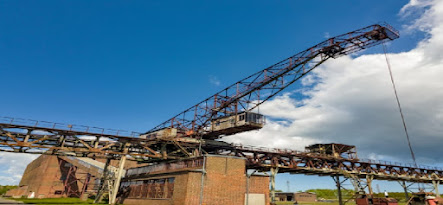The Middle East: A Hub for Oil Production and Exporting Technology
The Middle East: A Hub for Oil Production and Exporting Technology
The Middle East, often referred to as the "Oil Capital
of the World," has long been synonymous with the global oil industry. With
vast reserves of basic oil and natural gas, this region has played a pivotal
role in shaping the world's energy landscape. Beyond the extraction of
hydrocarbons, the Middle East has emerged as a major hub for oil production and
exporting technology. In this comprehensive exploration, we will delve into the
factors that make the Middle East a central player in the oil technology
sector, its contributions to the industry, and the innovations that continue to
redefine the way oil is produced, transported, and processed.
Abundant Reserves
The Middle East boasts the world's largest proven oil
reserves, with countries like Saudi Arabia, Iraq, Iran, and the United Arab
Emirates holding substantial quantities of crude oil. These abundant reserves
provide the foundation for the region's dominance in the global oil industry.
The availability of these vast resources has incentivized significant
investments in oil-related infrastructure and technology, driving innovation
and development.
Cutting-Edge Exploration and Drilling Technologies
The Middle East has been at the forefront of adopting
cutting-edge exploration and drilling technologies. Advanced seismic imaging
techniques, such as 3D and 4D seismic surveys, have revolutionized the region's
ability to discover and extract hydrocarbons from increasingly complex and
challenging reservoirs. Directional drilling and hydraulic fracturing
(fracking) have enabled the extraction of unconventional resources like shale
oil and gas.
Furthermore, the Middle East has been a pioneer in offshore
drilling technologies, particularly in the Persian Gulf. Deepwater drilling and
floating production storage and offloading (FPSO) facilities have allowed for
the development of offshore oil fields, ensuring a steady supply of crude oil
to global markets.
Enhanced Oil Recovery (EOR) Techniques
To maximize the recovery of oil from mature and declining
fields, the Middle East has actively pursued Enhanced Oil Recovery (EOR)
techniques. EOR methods, such as water injection, gas injection (CO2 and
natural gas), and chemical flooding, have been deployed to increase the yield
of existing reservoirs.
For instance, in Oman, water injection projects have been
instrumental in reviving older oil fields and maintaining production rates.
Saudi Arabia, too, has embarked on massive EOR initiatives, utilizing
cutting-edge technologies to extract more oil from its vast reserves.
Strategic Oil Infrastructure
The Middle East has invested heavily in oil infrastructure,
including pipelines, storage facilities, and export terminals. The region's
strategic location, with access to the Red Sea and the Persian Gulf, has
allowed for efficient transportation of crude oil to global markets.
Notably, the Strait of Hormuz between Iran and Oman is a
critical chokepoint for global oil transportation. The Middle East's control
over this passage underscores its influence in the international oil trade.
Moreover, the construction of vast oil export terminals in countries comparable
Saudi Arabia and the UAE has facilitated the loading and shipment of crude oil
to destinations worldwide.
Geopolitical Significance
The Middle East's geopolitical significance in the oil
industry cannot be understated. The region's oil reserves have often been a
focal point of international diplomacy and conflict. As a result, Middle
Eastern nations have strived to develop and safeguard their oil production and
export capabilities, further driving investments in technology and infrastructure.
Sustainable and Clean Technologies
In recent years, the Middle East has also made strides in
adopting sustainable and clean technologies for oil production. This includes funds
in carbon capture and storage (CCS) to reduce greenhouse gas emissions and the
development of solar energy solutions to power oil operations. These
initiatives reflect the region's commitment to balancing its role as an energy
provider with environmental responsibility.
Conclusion
The Middle East's status as a major hub for oil production
and exporting technology is deeply rooted in its vast reserves, pioneering
spirit, and strategic location. By consistently adopting cutting-edge
exploration, drilling, and recovery technologies, the region has not only
ensured its continued prominence in the global oil industry but has also
contributed to the evolution of the sector as a whole. As the world transitions
towards cleanser energy sources, the Middle East's expertise in sustainable
technologies will likely play a pivotal roles in shaping the future of the oil
and gas industry.




Comments
Post a Comment